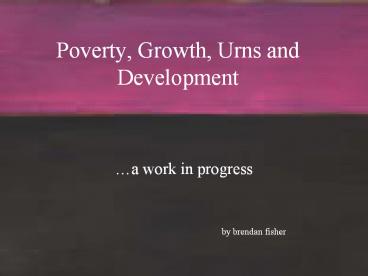Poverty, Growth, Urns and Development - PowerPoint PPT Presentation
Title:
Poverty, Growth, Urns and Development
Description:
Developed World needs cheap, raw materials. Developed investment would never be high enough ... the hunters, horse loggers, puppies and pizza deliverers of the ... – PowerPoint PPT presentation
Number of Views:20
Avg rating:3.0/5.0
Title: Poverty, Growth, Urns and Development
1
Poverty, Growth, Urns and Development
- a work in progress
by brendan fisher
2
Is Development
- Economic Growth that reallocates production
factors from low productivity, labor intensive,
decreasing returns systems1 - The increase in quality of goods and services as
defined by their ability to increase human
well-being2
(Adelman and Morris 1997) (Daly and Farley 2003)
3
Economic Paradox
- Three moves to advancement
- Trade labor intense system for capital intense
system - Move from limited exchange to market system
- Replace dispersed rurality with dense urbanity
Ground Truth 1) Low initial endowment 2)
Population Growth 3) High capital intense
investment needed
4
And the Answer is
Growth!
- Early Neoclassical Growth Models
- Growth ƒ(capital, labor, technology)
- Decreasing returns to scale
- Solow Y ƒ (K AL)
- This led to convergence models and support for
the great levelerglobalization.
5
Growth and Convergence
6
Growth and Divergence?
(adapted from Bourguignon and Morrisson, 2002)
7
Why Divergence?
- NC1 Governments!
- NC2 Trade!
- NC3 More Capital Investments
- Classical Human Capital Endowment, Distribution,
Institutions
8
Cumulative Causation
- Todays bread is made with yesterdays wheat
Solow vs. Path Dependency
- NC Growth Theory
- Open Up
- Laissez Fair
- Capital Investment
- Development Success Story
- Minimal Foreign Invest.
- Government Protection
- Human Capital Investment
9
Urn Model
10
On to STELLA
Initial D issues in growth system can last
forever.
(Banerjee and Newman 1993)
11
Gandhian Urns
- Convergence is Impossible for
- Developed World needs cheap, raw materials
- Developed investment would never be high enough
- Biophysical Limits
12
Grow our way out?
- GWP increased for 4 trillion to 20 trillion
from 1950 to 1994, if we assume that in the last
50 years we have closed the global income gap by
20 then we would need 200 years and a GWP of
100 trillion to close the gap completely.
13
Gini in the Urn
- No real difference in global distribution of
wealth since 19501 - Yet, the GWP has grown 5 fold
- Cumulative Causation bettered Neoclassical Growth
theory - Its implications
1. (Adelman and Morris, 1997) (Bourguignon and
Morrisson, 2002)
14
Implications
- We cannot grow our way to development within the
confines of a finite world. - Carrying Capacity of Earth surpassed in 1976 if
we need a GDP of 8 times that of 1976 to erase
poverty, do we have 8 more Earths? - Look at initial conditions, follow a procedure
that works Human Capital, protection, non market
mechanisms - Daly boundless bull
- Modernization of poverty
15
Acknowledgements
I would like to thank all of the peeps in the
streets for congregatin, demonstratin and
generally keepin it real in the field. I would
also like to thank Dr. Erickson for the
intellectual conception and guidance of this work
in progress. And finally, I give props to all the
hunters, horse loggers, puppies and pizza
deliverers of the world.
Peace and Im Out Questions?































